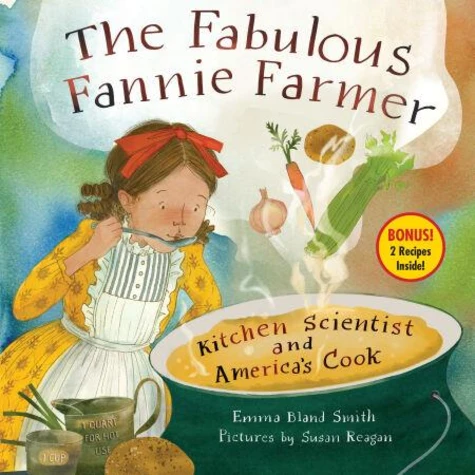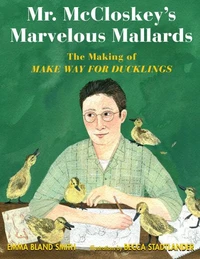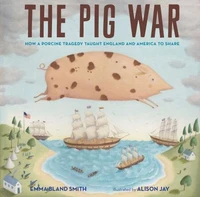The Fabulous Fannie Farmer. Kitchen Scientist and America’s Cook
Par : ,Formats :
Disponible dans votre compte client Decitre ou Furet du Nord dès validation de votre commande. Le format Epub fixed layout protégé est :
- Compatible avec une lecture sur My Vivlio (smartphone, tablette, ordinateur)
- Compatible avec une lecture sur liseuses Vivlio
- Pour les liseuses autres que Vivlio, vous devez utiliser le logiciel Adobe Digital Edition. Non compatible avec la lecture sur les liseuses Kindle, Remarkable et Sony
- Non compatible avec un achat hors France métropolitaine
 , qui est-ce ?
, qui est-ce ?Notre partenaire de plateforme de lecture numérique où vous retrouverez l'ensemble de vos ebooks gratuitement
Pour en savoir plus sur nos ebooks, consultez notre aide en ligne ici
- Nombre de pages40
- FormatEpub fixed layout
- ISBN978-1-63592-613-2
- EAN9781635926132
- Date de parution30/01/2024
- Protection num.Adobe DRM
- Taille23 Mo
- Infos supplémentairesepub
- ÉditeurCalkins Creek
Résumé
ALSC Notable Children's BookCCBC Choices 2025A NSTA-CBC Best STEM Book2025 Texas Topaz List2025 Rise: A Feminist Book Project TitleFannie Farmer, America's most famous cooking teacher, discovers that precise measurements are a recipe for cooking success in this STEAM picture book that includes two of her classic recipes.? School Library Journal, starred review? Youth Services Book Review, starred reviewWhen Fannie Farmer learned to cook in the late 1800s, recipes could be pretty silly.
They might call for "a goodly amount of salt" or "a lump of butter" or "a suspicion of nutmeg." Girls were supposed to use their "feminine instincts" in the kitchen (or maybe just guess). Despite this problem, Fannie loved cooking, so when polio prevented her from going to college, she became a teacher at the Boston Cooking School. Unlike her mother or earlier cookbook writers, Fannie didn't believe in feminine instincts.
To her, cooking was a science. She'd noticed that precise measurements and specific instructions ensured that cakes rose instead of flopped and doughnuts fried instead of burned. Students liked Fannie's approach so much that she wrote a cookbook. Despite skepticism from publishers, Fannie's book was a recipe for success. Written with humor and brought to life with charming illustrations, this book explores the origins of Fannie Farmer's quintessentially American cookbook.
A cookbook that was beloved because it allowed anyone to make tasty things, with no guessing, no luck-and certainly no feminine instincts-required.
They might call for "a goodly amount of salt" or "a lump of butter" or "a suspicion of nutmeg." Girls were supposed to use their "feminine instincts" in the kitchen (or maybe just guess). Despite this problem, Fannie loved cooking, so when polio prevented her from going to college, she became a teacher at the Boston Cooking School. Unlike her mother or earlier cookbook writers, Fannie didn't believe in feminine instincts.
To her, cooking was a science. She'd noticed that precise measurements and specific instructions ensured that cakes rose instead of flopped and doughnuts fried instead of burned. Students liked Fannie's approach so much that she wrote a cookbook. Despite skepticism from publishers, Fannie's book was a recipe for success. Written with humor and brought to life with charming illustrations, this book explores the origins of Fannie Farmer's quintessentially American cookbook.
A cookbook that was beloved because it allowed anyone to make tasty things, with no guessing, no luck-and certainly no feminine instincts-required.
ALSC Notable Children's BookCCBC Choices 2025A NSTA-CBC Best STEM Book2025 Texas Topaz List2025 Rise: A Feminist Book Project TitleFannie Farmer, America's most famous cooking teacher, discovers that precise measurements are a recipe for cooking success in this STEAM picture book that includes two of her classic recipes.? School Library Journal, starred review? Youth Services Book Review, starred reviewWhen Fannie Farmer learned to cook in the late 1800s, recipes could be pretty silly.
They might call for "a goodly amount of salt" or "a lump of butter" or "a suspicion of nutmeg." Girls were supposed to use their "feminine instincts" in the kitchen (or maybe just guess). Despite this problem, Fannie loved cooking, so when polio prevented her from going to college, she became a teacher at the Boston Cooking School. Unlike her mother or earlier cookbook writers, Fannie didn't believe in feminine instincts.
To her, cooking was a science. She'd noticed that precise measurements and specific instructions ensured that cakes rose instead of flopped and doughnuts fried instead of burned. Students liked Fannie's approach so much that she wrote a cookbook. Despite skepticism from publishers, Fannie's book was a recipe for success. Written with humor and brought to life with charming illustrations, this book explores the origins of Fannie Farmer's quintessentially American cookbook.
A cookbook that was beloved because it allowed anyone to make tasty things, with no guessing, no luck-and certainly no feminine instincts-required.
They might call for "a goodly amount of salt" or "a lump of butter" or "a suspicion of nutmeg." Girls were supposed to use their "feminine instincts" in the kitchen (or maybe just guess). Despite this problem, Fannie loved cooking, so when polio prevented her from going to college, she became a teacher at the Boston Cooking School. Unlike her mother or earlier cookbook writers, Fannie didn't believe in feminine instincts.
To her, cooking was a science. She'd noticed that precise measurements and specific instructions ensured that cakes rose instead of flopped and doughnuts fried instead of burned. Students liked Fannie's approach so much that she wrote a cookbook. Despite skepticism from publishers, Fannie's book was a recipe for success. Written with humor and brought to life with charming illustrations, this book explores the origins of Fannie Farmer's quintessentially American cookbook.
A cookbook that was beloved because it allowed anyone to make tasty things, with no guessing, no luck-and certainly no feminine instincts-required.





